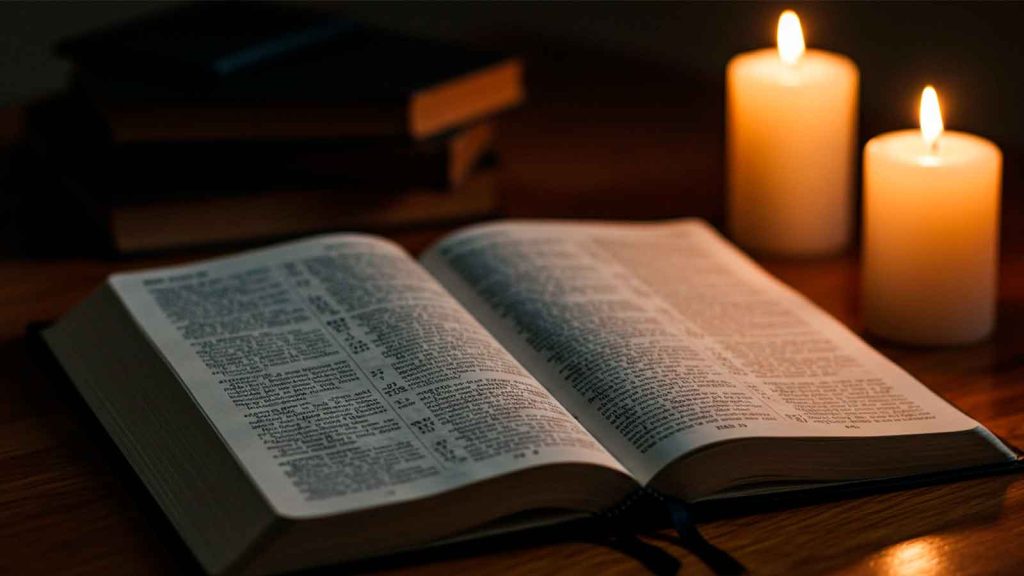Psalm 73 is one of the most striking texts in the Book of Psalms. It invites us to reflect on the apparent injustices of life and on God’s faithfulness even when everything seems meaningless. Written by Asaph, the psalm plunges into the faith crisis of a righteous man as he observes the prosperity of the wicked.
Psalm 73 Complete
¹ Truly God is good to Israel, to those who are pure in heart.
² But as for me, my feet had almost stumbled; my steps had nearly slipped.
³ For I was envious of the arrogant when I saw the prosperity of the wicked.
⁴ For there are no pangs in their death, and their strength is firm.
⁵ They are not in trouble as other people are; they are not afflicted like other men.
⁶ Therefore pride is their necklace; violence covers them like a garment.
⁷ Their eyes bulge with abundance; their hearts overflow with fantasies.
⁸ They scoff and speak with malice; loftily they threaten oppression.
⁹ They set their mouths against the heavens, and their tongues strut through the earth.
¹⁰ Therefore his people turn back to them, and waters of a full cup are drained by them.
¹¹ And they say, “How does God know? Is there knowledge in the Most High?”
¹² Behold, these are the wicked—always at ease, they increase in riches.
¹³ Surely I have kept my heart pure in vain and washed my hands in innocence.
¹⁴ For all day long I am afflicted and punished every morning.
¹⁵ If I had said, “I will speak thus,” I would have betrayed the generation of Your children.
¹⁶ When I tried to understand all this, it seemed a burden to me
¹⁷ until I entered the sanctuary of God; then I understood their end.
¹⁸ Surely You set them in slippery places; You cast them down to ruin.
¹⁹ How suddenly they are destroyed, completely swept away by terrors!
²⁰ Like a dream when one awakes, so, O Lord, when You arise, You will despise their image.
²¹ When my heart was grieved and my spirit embittered,
²² I was senseless and ignorant; I was a brute beast before You.
²³ Yet I am always with You; You hold me by my right hand.
²⁴ You guide me with Your counsel, and afterward You will receive me to glory.
²⁵ Whom have I in heaven but You? And on earth I desire none besides You.
²⁶ My flesh and my heart may fail, but God is the strength of my heart and my portion forever.
²⁷ For, behold, those who are far from You shall perish; You destroy all who are unfaithful to You.
²⁸ But as for me, it is good to draw near to God; I have made the Lord GOD my refuge, that I may declare all Your works.

Complete Explanation of Psalm 73
Psalm 73:1
“Truly God is good to Israel, to those who are pure in heart.”
The psalmist begins with an unquestionable statement of faith: God is good. This truth is the starting point for all the reflection that follows. Even amid doubts and injustices, he affirms that God’s goodness is directed to those who keep their hearts pure.
Psalm 73:2
“But as for me, my feet had almost stumbled; my steps had nearly slipped.”
Here, Asaph reveals his personal crisis. He confesses that he nearly lost his faith when he saw the apparent advantages enjoyed by the wicked. His “steps” represent his spiritual life, which was on the verge of collapse.
Psalm 73:3
“For I was envious of the arrogant when I saw the prosperity of the wicked.”
The root of his inner conflict was envy. The psalmist was troubled by the prosperity of arrogant, evil people, which seemed to contradict God’s justice.
Psalm 73:4
“For there are no pangs in their death, and their strength is firm.”
The wicked appeared to live without suffering, dying peacefully and keeping their strength until the end. This contrasted with the reality of many righteous people who faced pain and hardship.
Psalm 73:5
“They are not in trouble as other people are; they are not afflicted like other men.”
They seem exempt from the sorrows that afflict the rest of humanity. This apparent immunity increases the psalmist’s frustration.
Psalm 73:6
“Therefore pride is their necklace; violence covers them like a garment.”
Their arrogance adorns them like jewelry, and violence is part of their identity. They boast about the evil they do, flaunting it proudly.
Psalm 73:7
“Their eyes bulge with abundance; their hearts overflow with fantasies.”
This verse describes the excesses of the wicked. Their desires are boundless, and their greed surpasses all imagination.
Psalm 73:8
“They scoff and speak with malice; loftily they threaten oppression.”
They behave perversely and speak arrogantly. They are committed to wrongdoing and talk about others with contempt.
Psalm 73:9
“They set their mouths against the heavens, and their tongues strut through the earth.”
They blaspheme against God and spread their influence everywhere—a portrait of arrogance that respects no limits.
Psalm 73:10
“Therefore his people turn back to them, and waters of a full cup are drained by them.”
Many people turn to them, influenced by their words and lifestyle. The phrase “waters of a full cup” suggests passive, dangerous acceptance.
Psalm 73:11
“And they say, ‘How does God know? Is there knowledge in the Most High?’”
They question God’s sovereignty and knowledge. They live as if He were indifferent or absent, denying His omniscience.
Psalm 73:12
“Behold, these are the wicked—always at ease, they increase in riches.”
Asaph concludes that the wicked live securely and grow richer, heightening his sense of injustice.
Psalm 73:13
“Surely I have kept my heart pure in vain and washed my hands in innocence.”
The psalmist starts to think that living a righteous life was useless. His crisis makes him doubt whether faithfulness to God is worthwhile.
Psalm 73:14
“For all day long I am afflicted and punished every morning.”
While the wicked prosper, he suffers daily. The sense of being punished for doing right consumes him.
Psalm 73:15
“If I had said, ‘I will speak thus,’ I would have betrayed the generation of Your children.”
Despite his pain, he did not voice his revolt so as not to scandalize the faithful. He shows maturity by restraining his words.
Psalm 73:16
“When I tried to understand all this, it seemed a burden to me.”
Trying to comprehend these injustices caused him more anguish. It was a deep spiritual and emotional issue.
Psalm 73:17
“Until I entered the sanctuary of God; then I understood their end.”
Everything changes when he seeks God’s presence. In the sanctuary he gains discernment and understands that the destiny of the wicked is tragic.
Psalm 73:18
“Surely You set them in slippery places; You cast them down to ruin.”
Their prosperity is fragile like thin ice. God will allow their sudden and inevitable fall.
Psalm 73:19
“How suddenly they are destroyed, completely swept away by terrors!”
They will fall swiftly and definitively. Terror will be their end, in stark contrast to the apparent peace they enjoyed.
Psalm 73:20
“Like a dream when one awakes, so, O Lord, when You arise, You will despise their image.”
The life of the wicked is as illusory as a dream. When God acts, their entire image of success will vanish.
Psalm 73:21
“When my heart was grieved and my spirit embittered.”
The psalmist acknowledges the bitterness in his heart. His envy produced physical and spiritual suffering.
Psalm 73:22
“I was senseless and ignorant; I was a brute beast before You.”
He admits that his perspective was limited and irrational. He felt ignorant before God’s wisdom.
Psalm 73:23
“Yet I am always with You; You hold me by my right hand.”
Despite everything, God did not abandon him. The Lord sustained him faithfully, even in his confusion.
Psalm 73:24
“You guide me with Your counsel, and afterward You will receive me to glory.”
The psalmist trusts in God’s guidance in this life and in the promise of an eternal future by His side.
Psalm 73:25
“Whom have I in heaven but You? And on earth I desire none besides You.”
He declares that God is all he has. Nothing and no one is more desirable than the divine presence.
Psalm 73:26
“My flesh and my heart may fail, but God is the strength of my heart and my portion forever.”
Even physically and emotionally weak, he finds strength in God. The Lord is his eternal inheritance.
Psalm 73:27
“For, behold, those who are far from You shall perish; You destroy all who are unfaithful to You.”
Those who turn away from God perish. Judgment is certain for those who abandon the Lord’s path.
Psalm 73:28
“But as for me, it is good to draw near to God; I have made the Lord GOD my refuge, that I may declare all Your works.”
The psalm ends with a renewed statement of faith. To be near God is the greatest good. He chooses to trust the Lord and proclaim His wonders.

Understanding the Context of Psalm 73
Psalm 73 opens the third book of Psalms and is attributed to Asaph, one of the chief Levites in charge of temple music. This composition stands out for its honest, introspective tone, addressing a spiritual dilemma: Why do the wicked prosper while the righteous suffer?
Asaph begins by expressing his envy of the arrogant and his frustration at the prosperity of the wicked. However, the psalm takes a transformative turn when he enters God’s sanctuary and starts seeing everything from a new perspective.
The Poetic Structure and Central Message
Psalm 73 has a structure that reveals the psalmist’s emotional progression. From questioning to worship, each verse is filled with emotion and wisdom. The central message revolves around understanding that the true reward is not earthly riches but intimacy with God.
The psalmist’s inner conflict
At the beginning of the psalm, Asaph expresses his conflict upon seeing unjust people living in abundance and health. This raises a crisis in him: Is living with integrity really worth it?
The change in perspective
The turning point occurs when he enters the temple and meditates on the wicked’s ultimate destiny. This experience completely changes his worldview, showing that divine justice never fails, even if it seems delayed.
The reaffirmation of faith
At the end of Psalm 73, Asaph recognizes that the greatest gift is God’s presence. He declares that even if everything else fails, God is his eternal portion.
Central Themes of Psalm 73
Envy as a spiritual trap
Envy appears as the trigger of the psalmist’s crisis. Seeing the success of the wicked almost caused him to stumble in his faith. This feeling is common and dangerous because it can lead us away from a balanced view of life.
The fate of the wicked
The text shows that the prosperity of the wicked is illusory. They stand on slippery ground, and their end will be sudden and tragic. Psalm 73 affirms that without God, no success is genuine.
The reward of the righteous
Even without material wealth, those who walk with God possess something infinitely more valuable: fellowship with the Creator. This is the true inheritance of the righteous.
Key Verses in Psalm 73
Psalm 73:1
“Truly God is good to Israel, to those who are pure in heart.”
This opening sums up the essence of faith: God is good, even when everything around us seems to indicate otherwise.
Psalm 73:17
“Until I entered the sanctuary of God; then I understood their end.”
This verse marks the turning point. Intimacy with God sheds light on life’s mysteries.
Psalm 73:26
“My flesh and my heart may fail, but God is the strength of my heart and my portion forever.”
One of the most powerful verses of the psalm, it reveals total surrender and unwavering trust in God.

Applying Psalm 73 Today
Psalm 73 remains current and relevant. In a world where success is often tied to material possessions, this psalm invites us to rethink our values. It teaches us not to judge life by appearances and to trust divine justice.
How to apply Psalm 73 in everyday life
- Avoid comparing your life with that of others.
- Seek moments of spiritual reflection to realign your vision.
- Remember that true value lies in God’s presence.
Interesting Facts About Psalm 73
One of the most theological psalms
Psalm 73 is considered by many scholars to be one of the most theologically profound psalms. It intensely discusses God’s justice and the nature of faith.
Connection with the Book of Job
Like Job, Asaph faces a faith crisis when observing life’s injustices. Both reach the same conclusion: God is sovereign, even when we do not understand His ways.
The number 73 and its symbolic position
This psalm is the first in the third book of Psalms, a symbolic division that marks a new, more introspective and reflective spiritual cycle.
The Wisdom of Asaph
Asaph was one of the chief musicians in David’s time, but he was also a man of deep spirituality. His psalms are full of practical teachings and eternal truths. In Psalm 73, he shares his journey with sincerity, becoming a mirror for many of us.
Why Is Psalm 73 So Important?
Because it speaks directly to the soul of anyone who has ever felt discouraged or wronged. It does not deny difficulties but points to a sure refuge: God’s presence. Its message teaches us to face suffering without losing faith.
Practical Lessons from Psalm 73
- All that glitters is not gold. The appearance of success can be deceiving.
- True faith withstands questioning.
- God is our security, not circumstances.
Complementary Verses
Besides Psalm 73 itself, other biblical texts help to deepen its message:
- Psalm 37: Also addresses the prosperity of the wicked and the reward of the righteous.
- Ecclesiastes 8:14: Speaks about the apparent injustices of life.
- Jeremiah 12:1: The prophet also questions why the wicked prosper.
Guided Meditation with Psalm 73
You can use Psalm 73 as a basis for personal meditation. Here is one example:
- Read the entire psalm aloud.
- Reflect on which part touched your heart the most.
- Write down your feelings and doubts.
- Pray, asking God for clarity and trust.
The Sanctuary’s Transforming Power
The key point of Psalm 73 is the moment Asaph enters the sanctuary. This represents not only a physical place but a spiritual state in which the mind aligns with divine truth.
What does the sanctuary represent?
- A place of revelation.
- A space of peace.
- An opportunity for inner change.
Testimonies Inspired by Psalm 73
Many people report finding comfort in the words of Psalm 73 during times of anguish. Whether facing workplace injustices, family losses, or personal struggles, this psalm serves as an anchor for faith.
Psalm 73 and Christian Hope
The New Testament also echoes the teachings of Psalm 73, especially in the life of Jesus, who suffered unjustly but trusted completely in the Father. The concept of an “eternal portion” aligns with the promise of eternal life with God.
FAQ – Frequently Asked Questions About Psalm 73
What does “God is my portion” mean?
It means that God is sufficient to meet every need of the soul—a metaphor for complete and lasting satisfaction.
Why did the psalmist envy the wicked?
Because he saw that, despite their evil, they lived comfortably. This triggered an inner crisis about the value of righteousness.
How can one overcome spiritual envy?
By seeking intimacy with God, focusing on eternity, and practicing daily gratitude.
Can Psalm 73 be used in times of doubt?
Yes, it is ideal for moments of spiritual crisis because it shows the path to restoration through God’s presence.
What is the best way to study Psalm 73?
Read slowly, reflect on each verse, and apply its lessons to everyday life.
READ ALSO:
- Psalm 48: The Greatness of God Revealed in Zion
- Psalm 49: An Invitation to Reflect on True Wealth
- Psalm 47: Exaltation to the Supreme God Who Reigns over the Whole Earth
- Psalm 45: A Royal Song of Love and Glory
FOLLOW US ON FACEBOOK
I hope you enjoyed it
Leave your message of faith below!